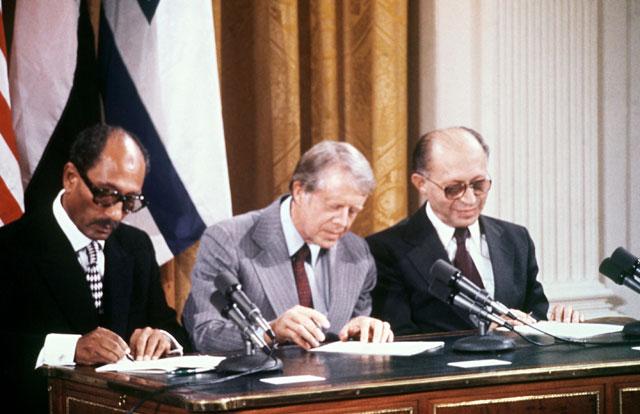You are here
Delving into Camp David negotiations
By Hisham Khatib - Dec 14,2014 - Last updated at Dec 14,2014
Thirteen Days in September
Lawrence Wright
Alfred A. Knopf, Publisher
2014,
Pp. 293
This is a remarkable book, well researched and interesting to read. It details, in almost 300 pages the negotiations that took place in Camp David over 13 days during September 1978. These intensive negotiations, which President Carter personally conducted with Egyptian President Sadat and the Israeli Prime Minister Begin, culminated in the signing of the Camp David Accord and led to peace treaty between Egypt and Israel. This treaty, which is still widely unpopular in Egypt, endured for the last thirty-five years and looks to sustain for the foreseeable future.
The author explained that when the leaders of Egypt and Israel met at Camp David, their two countries had engaged in four wars in the previous 30 years. The conflict evolved into a tug-of-war over territory — mainly, the Sinai Peninsula — and the right of the Palestinians to return to their former homeland. Although clashes continue between Israel and its other neighbours, the Camp David agreement removed the only Arab adversary that posed a genuine military threat to the future of Israel.
The book as the author claims is actually three chronologies, and he handles them ably. The first is the 13 days of Camp David summit forms the architecture of this account. Beneath that is a history of the modern Middle East as seen through the eyes of the remarkable men who were present at the negotiation and in many respects made that history. At bottom are the tectonic plates of the three religions as revealed in the stories of the Torah, the Bible, and the Koran.
The author goes on to argue that the struggle for peace at Camp David is a testament to the enduring force of religion in modern life, as seen in its ability to mould history and in the difficulty of shedding the mythologies that continue to lure societies into conflict.
Reading this book, and having personally witnessed and lived the whole history of the Arab-Israeli conflict, particularly the crushing defeat in 1967 and the loss of precious Arab Land, Jerusalem and the West Bank of Jordan, the Sinai Peninsula and the Golan Heights, I cannot but admire the persistent efforts of Sadat to recover Egyptian territory occupied by Israel after June 1967. Since he took over from Nasser in 1970, he made this goal the main target of his presidency. Sadat utilised all tools of diplomacy to attain his sacred goal of reclaiming sovereignty over Sinai, although with constraints. In pursuing his sacred goal he utilised all diplomacy tools — the war of 1973, the daring visit to Jerusalem in November 1977 and the direct face-to-face negotiations in Camp David in autumn of 1978. In the end, in my judgement and that of other independent observers like the author of this book, he was the main winner at Camp David, but at a price. I recall that in 1986, Boutros Ghali who was Egypt’s minister of state at that time told me in a personal conversation that history will prove that Sadat outwitted Begin at Camp David. However Begin had other priorities, for him the West Bank was more important than Sinai, and he was willing to trade.
Sadat tried to negotiate the return of Egyptian sovereignty over Sinai, as well as Arab sovereignty over Jerusalem and the West Bank. Although he succeeded in the first goal, he miserably failed/sacrificed the second goal. The West Bank is still an occupied territory, Israeli occupation is becoming more entrenched there and the peace envisioned between Israel and the Palestinians was never fully implemented, which is why turmoil in the region continues. In signing the treaty with Israel, Egypt severed its link to the Palestinian cause. Without a powerful Arab champion, Palestine and the region became a mascot for Islamists and radical factions who could only do further damage to the prospects of peaceful and just response to the misery of the abandoned Palestinian people.
Of course this Egyptian/Israeli accord was impossible without President Carter’s personal involvement. He personally conducted the negotiations, set reasonable goals and threatened risky US friendship and clout if either party did not comply with US final position/dictate. He made the stakes high for both parties if any of them caused the failure of the negotiations. Carter brought the weight of his office down hard, threatening to break off relations with Egypt and end their personal friendship. Carter made it clear to both men that if either of them deserted the process; they would have a problem with the United States — a problem neither man could afford. Carter allowed each side to make concessions to the US that they couldn’t make to each other.
In the end both parties succumbed to the US pressure, one of them, Sadat, willingly, and the other Begin (but not his team who were in favour of the Accord) hesitantly. Nothing else could overcome the obstinacy of Begin and his tunnel vision of the history of the Holy Land.
The author tried to be honest and fair in presenting the intricacies of the Arab-Israel conflict. To an extent I feel he succeed in this. The Camp David negotiations only cover part of the book; the rest is mainly biographies of the main characters that met at Camp David and their background and careers. One learns a lot from this, since it greatly influenced their approach to the negotiations, their tactics and their values.
The author also throws doubt about Zionists historic claim to the Holy Land and Jerusalem and their biblical narrative. He rationally argues these issues as well as the story of the Exodus. The author writes “for the secular Jews who created modern Israel, the story of the Israelites’ presence in Egypt, and the Exodus, and the arrival in Canaan 3,000 years ago is a testament to Jewish title to the land. History and archaeology combine to tell a different story, however. There may have been Jews in Egypt, but there is no documentation by the ancient Egyptians — scrupulous record keepers — of their presence. It is possible that the biblical chronology is wrong”.
This is an important chronicle in documenting the Arab-Israeli conflict; it researches past history and documents recent events that are novel even to the learned scholar of this conflict. I wish that it would be translated into Arabic very soon.
Related Articles
PARIS — Forty years ago Egypt and Israel signed the first ever peace treaty between Israel and an Arab nation, upturning Mid
AMMAN — Did Egyptian and American leaders sell out the Palestinians and their quest for statehood in the widely acclaimed 1978 Camp David Ac
Preventing Palestine: A Political History from Camp David to OsloSeth AnziskaPrinceton/Oxford: Princeton University Press, 2018Pp.435 I


















